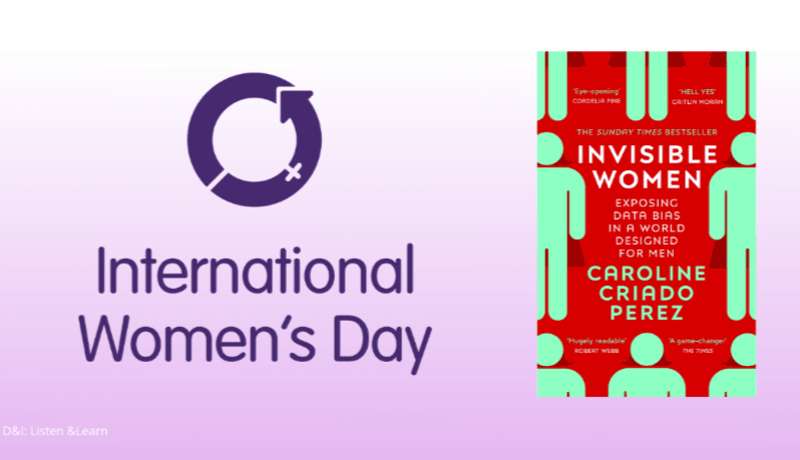A message from Deirdra Moynihan on IWD
Posted on March 2021

As we mark International Women’s Day (yay we get a whole day!) I’ve been asking myself a question – why it is that we, men and women alike, don’t all challenge and call out and demand an end to the continued gender bias and inequality in our society? Is it possible that we are simply not aware of the scale and depth of the inequality that exist around us? Are we all partly blind to the everyday inequalities women currently live with mainly as a result of us living in societies predominantly designed by men for men?
So, rather than ranting in absolute fury, I thought I would suggest something practical to improve knowledge.
Let me introduce you to Caroline Criado Perez - a British campaigner and writer who has challenged, fought and won a series of high-profile campaigns for gender equality. She is a great example of how to “actually do stuff” when we find an unjust situation. She has successfully campaigned for women to be seen on British banknotes; for Twitter to deal properly with online abuse; and for a monument to celebrate women getting the vote (the statue of Millicent Fawcett that now stands in Parliament Square). What she did next, though, is what I would particularly like to share with you. She wrote a book called Invisible Women - an amazing, witty, insightful book, based on thorough research and data. In it she shows that many of the reasons that women are so badly treated in our society is because societies have been predominantly designed, not for all people, but by men for men. Most of the people with power, most of the people who get to make the decisions that make a difference in the world, have been and still are men – and it isn’t that men consciously go out of their way to make life bad for women but rather, they do this because they are men, and as such they have historically designed and are still designing the world to work for them. And when that world simply doesn’t work for women, these men don’t even notice. There is no patriarchal conspiracy or malicious intent – just neglect, self-interest, and perhaps a little dose of wilful blindness based on those with power focused solely on their own needs.
Imagine a world where your phone is too big for your hand, where your doctor prescribes drugs that are wrong for your body, where in a car accident you are 47% more likely to be seriously injured, where your heart attack is likely to be misdiagnosed and where every week the countless hours of work you do are not recognised or valued. This is a woman’s world! In the fields of design, law, planning, transport, healthcare, and many others, the world designed by men for men is placing women at serious disadvantage and sometimes in danger.
Invisible Women addresses these issues with humour, facts and hard data and is one of the best things I’ve read on any subject – witty, amazingly researched, jaw-dropping. It really did have a profound impact on how I see the world. Don’t just take my word for it: the book has won many prizes including the FT Book of the Year, and reviews have said “stunning… reveals the sexism that is hidden in plain sight”; “data that makes an overwhelming case… a compelling call for action”; “powerful stories… this is what moves minds”; “casts a bright light on one of the most important issues of our time” ,“intelligent, accessible and witty” – as I’d hope we would all aspire to be!
If you want to learn more about gender inequality and be better able to argue for equality – read this book. I am so passionate about this book I have made an offer to buy a copy of Invisible Women for everyone at Venn Group. I believe it will change the way you think and I’m really hoping that, armed with more knowledge about gender bias and inequalities, we all, women and men, will be better equipped and ready to challenge, call out and demand an end to inequality.
Recent Articles
-
Flipping the Script on Islamophobia | Personal perspective | Nadia Muzaffar
Conversation is a powerful tool. Even a two-minute chat can change a perception, correct a misco...
13 days ago -
Pancreatic Cancer Awareness Month | Personal Perspective | Louise Francis
This year, our Birmingham office chose to fundraise for Pancreatic Cancer UK in support of my br...
20 days ago -
Personal Perspective| Islamophobia Awareness Month with Safiyyah Ayaz
For Islamophobia Awareness Month, we are honoured to feature passionate employees who have chosen...
about 1 month ago